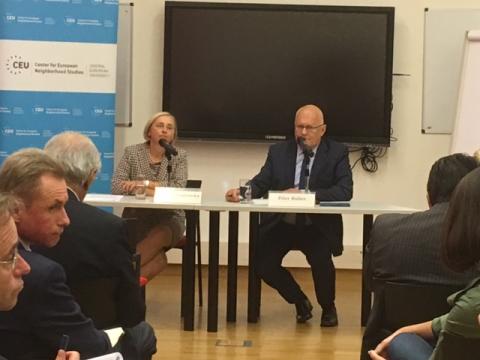Event report - "Bulgaria in the European Union”

The CEU Center for European Neighborhood Studies, in the framework of its Ambassadorial Lecture Series, hosted a public lecture on 26 September 2017 entitled “Bulgaria in the European Union” delivered by H.E. Ms. Ulyana Bogdanska, Ambassador of Bulgaria to Hungary. The lecture was attended by a distinguished group of students, diplomats, and academics.
In her opening remarks, Ambassador Bogdanska discussed the benefits that Bulgaria has enjoyed since joining the European Union, from economic growth to the convenience of cross border travel within the European continent. She also reaffirmed Bulgaria’s commitment to the EU, stating that despite the country’s internal challenges, Bulgaria retains its dedication to the core values of democracy and freedom.
The Ambassador went on to discuss Bulgaria’s upcoming role as presidency of the Council of the European Union and what the priorities of this presidency will include. She first addressed the migrant issue and stated that Bulgaria’s main position, and one that it will stand by during the presidency, is one of unity. The Ambassador stated that in order to address the security concerns of citizens, the European Union should work together instead of shifting the burden of the migrant crisis onto one or few countries. She argued that the current European asylum system was not applicable and should be reformed to incorporate principles such as respect, human rights and shared responsibility. According to the Ambassador, control of external borders should be secure and “frontline states should not be left alone to protect themselves”. Additionally, Ambassador Bogdanska went on to state that bilateral talks with Turkey regarding this issue should continue and remain a priority for the EU.
Next, the Ambassador discussed the European enlargement process and Bulgaria’s commitment to including its neighbors, especially the Western Balkans, as “Europe will not be completed without the Western Balkans as part of it”. She argued that the EU has an interest in a stable, prosperous, Western Balkans and, as a result, integration with this area should become a priority of EU foreign policy. Ambassador Bogdanska also outlined Bulgaria’s goal during the presidency to merge ideas from all member states and forge a coherent foreign policy. She emphasized the challenges the EU faces, such as increasing instability, euro-skepticism, but reminded the audience that cohesion and solidarity are core principles of the union and it is in everyone’s interest to overcome divisions between East and West, North and South. The Ambassador finished her speech by reaffirming Bulgaria’s goal during the presidency to include the Western Balkans, Turkey and association agreement countries such as Moldova and Georgia into efficient dialogue with the EU about integration, migration, and other issues.
The public lecture was concluded with a Q&A session with the audience offering their comments and posing questions to the Ambassador.
